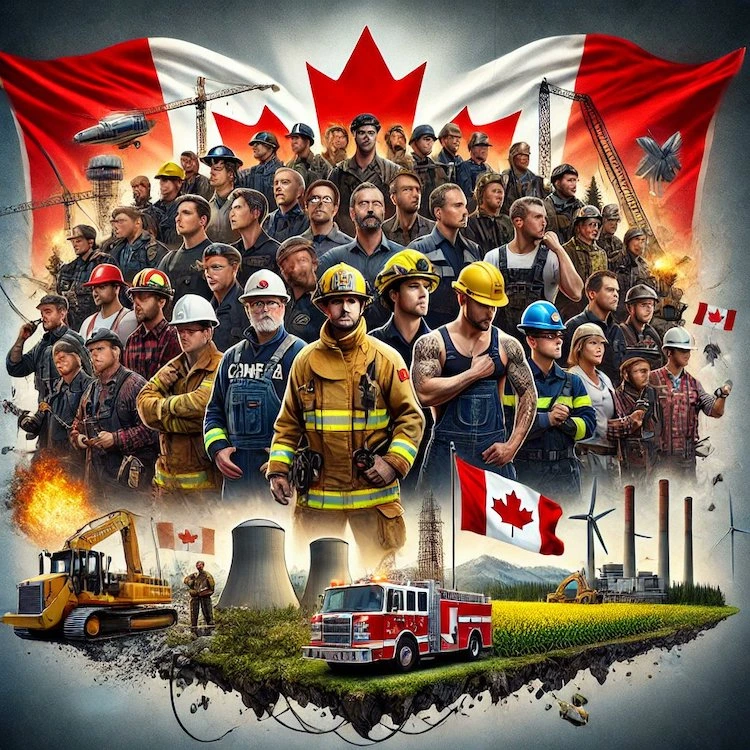The Conservative Party of Canada (CPC), under Pierre Poilievre’s leadership, has presented Canadians with a comprehensive set of policy solutions over the past few years. While their approach has evolved, becoming more focused, pragmatic and “right on the money” in solution development, we have a little bit of skepticism regarding their ability to “aggressively enforce land and admin optimization policies” required to serve the needs of Canadians, particularly concerning “aggressive land supply policy” and “aggressive administrative reform”, BUT WE HAVE NO CONCERNS regarding resource management, economic management, labour market management, public safety management, culture and heritage management (cultural and identity protection), national security management, or any concerns regarding foreign influence predisposition from international entities like the WEF, CCP, Russia, BRICS, WHO or UN.
1. Real Economy and STEM Engagement:
The CPC has taken commendable steps to engage with vital sectors like STEM, manufacturing, trucking, and construction. Their direct involvement with industry leaders and numerous visits to these companies indicate a genuine desire to understand ground-level realities.
This focus on practicality is further evidenced by their efforts to attract skilled professionals through targeted immigration policies, especially in STEM fields.
This commitment to the real economy suggests a move away from ideological posturing toward pragmatic solutions essential for Canada’s economic growth (WeAbide Immigration) (Nationwide Visas) (RTS Inc).
This understanding will be critical, towards fixing a broken Canada, is it provides the right understanding and policy direction efforts, to shift the education and career tracks from one focused on administration to one focused on professionals/specialists (what is missing in Canada).
What is missing in Canada, is labour market re-balancing towards doubling the STEM professional fields (surgeons, carpenters, technicians, trades, technologists, engineers, miners, energy workers, etc..),and CPC seems to be working very hard to address this, even before they are elected!!!
2. Navigating the Land Policy Labyrinth:
The “Building Homes, Not Bureaucracy” initiative highlights the CPC’s intention to tackle Canada’s housing crisis by streamlining bureaucratic processes and encouraging increased housing supply. However, the policy’s effectiveness depends heavily on their ability to address the root cause: Canada’s restrictive and complex land policy.
Exposing the “Globalist Prison Policy”:
Only about 0.2% to 0.25% of Canada’s vast landmass is currently used for urban city area and it seems like 99.75% is kept aside for someone else (possibly the globalists or other countries, perhaps China or India or United States). This alarmingly low figure suggests a deliberate strategy to restrict Canadians’ access to affordable housing, using enforced land scarcity towards trapping them in a cycle of high rents, high mortgages, high purchase costs and limited economic mobility.
This approach aligns with concerns about a “globalist prison policy,”where reduced private ownership and increased reliance on centralized control are promoted, potentially influenced by organizations like the WEF. It almost looks like the goal is to use AI and digital controls on ID block-chains, to gate Canadians into strata condo areas (this is very dangerous in case of crises, threats, challenges, dangers that are set to emerge in the world from 2020 to 2050, also known as “The Great Filter” problem).
Strata areas are a weaker form of ownership, which might come under the influence of city administrators one day, whereas rural lots are safer and further out from city control (which is why the WEF/corporate/political interests might try to keep Canadian citizens out of these safer/freedom rural areas).
These strata condo city areas of ultra high density level are dangerous because ultra dense condos do not provide life sustaining capability should supply chains fail, electrical grids fail, critical infrastructure fail, or simply economic failures such as “economy velocity drop to 0” or “national debt caused inflation to hit high towards hyperinflation“.
The CPC policy seems to work against this, to try to create the federal policies required to break people free out of the condo city areas, to safer rural areas or freehold areas (which are safer from AI systems and administrators as well, and also biologically safer in terms of standard of living, family formation, births, and longevity).
CPC’s Litmus Test:
Loyalty to Whom? The CPC’s actions concerning land policy will reveal their true allegiance; the citizens of Canada or the foreign interests. The last four years indicates they are fighting with the citizens of Canada, and policy looks to be heading in this direction of increasing freedom, standard of living, safety, and STEM progress (economic 21st century compatibility that is a requirement now of nations to survive economically).
Will they maintain the status quo, effectively serving the interests of powerful entities potentially aligned with the WEF (such as PM Trudeau, Chrystia Freeland and Steven Guilbeault does with their iron grip on Liberal Party Senators and the liberal institution), or will the upcoming CPC government prioritize Canadians by releasing Crown lands for affordable housing? So far, there is no reason to indicate it will be institutes like WEF who can control us in the future with a CPC government.
But it must be remembered, that political parties need the ability to negotiate at the international level, in order to protect their citizens as well. A fully isolated policy, like North Korea, is not the best strategy either, so at a minimum, Pierre Poilievre needs the ability to negotiate with Europe, USA and the countries interested in energy and minerals.
Jurisdictional Challenges:
The complex interplay between federal, provincial, and municipal governments in determining land use presents a significant challenge. While the federal government sets the framework, provinces and municipalities hold the real power over development. This requires the CPC to navigate this system skill-fully and potentially advocate for increased federal authority to ensure their vision is implemented effectively.
3. Guarding National Wealth:
While the CPC advocates for responsible resource management and fair royalty distributions to benefit Canadians, their commitment to prioritizing national interest seems solid. Their plan to revitalize the mining and energy sectors, the primary sectors of Canada, which will attract foreign investment into businesses of Canada and the stock markets (which have been dead for a decade under PM Trudeau and Christya Freehand and Steven Guilbeault).
However, we have to keep an eye on the CPC so as to make sure that citizens keep enough % reward from the resource and energy exports as Canadian citizens, so we will have to continue to be vigilant here (and not get exploited like happens to the small countries in their desperation to do resource deals). But we believe that Canada is so absolutely broken, that the CPC will have to take a good amount from the resource revenues in order to actually fix the country, which will be required, if they wish to stay in power, which they seem to want this very much. So it is guaranteed that the projects in resources and energy MUST provide value to Canada, because if they don’t, Canada would fail.
The CPC must also demonstrate their ability to resist potential external influence from organizations like the WEF, whose agendas may not always align with Canada’s long-term interests (WeAbide Immigration) (RTS Inc).
We must remind the CPC, that the value of Canada, in energy and resource terms, is far higher than the WEF alliance of corporations, all 1100 of them. If velocity of capital drops to zero, or if hyperinflation hits, their assets mean nothing, and Canada’s actual mineral and energy assets go through the roof in hyperinflations, in nominal CAD terms, and they do also go up like this during war or any other crisis. We can buy the WEF if we play our cards right as a country and the right crisis comes along.
The idea, is to stop the foreign interests from demoralizing the Canadian citizens and the politicians, and to realize we are way wealthier than the WEF can ever hope to be, as they are stacked with office buldings and financial assets that are just currency but nothing indexed well to inflation (which is why they want the 10 million square km of land, resources, energy and control over the minds and the lives of Canadian citizens).
4. Challenging International Agendas:
The CPC’s opposition to carbon taxation, framing it as a burden on Canadians, and their critical stance on international agreements that they view as overreaching or misaligned with Canada’s context signal a commitment to national sovereignty.
However, this talk must translate into action. Canadians will be watching to see how effectively the CPC can resist international pressure and prioritize the interests of their citizens, particularly in the face of potentially conflicting agendas from entities like the WEF (WeAbide Immigration) (RTS Inc).
The way to judge if a political party is loyal to the citizens of Canada, is their stance on taxation systems, whether the system i a carbon tax system that might become global taxation system to international elites/unelected elites.
In essence, this is what the global carbon tax could be, as it seems to be common to many countries, and without origins in any country (definitely did not originate with citizens in Canada).
By opposing a taxation change, it means that the CPC is protecting the “national authority of citizens” or the “nation state”, and in this, it seems to be a loyal action in the defence of “citizen authority” and the human rights package of legislation embedded within the parliamentary system of Canada. This is good, it means that the CBC are on the side of life and of humanity, not just Canadian citizens.
5. Streamlining Government: Striking a Balance:
The CPC’s proposed administrative reforms, including spending cuts to streamline government operations, are a step in the right direction. However, the anticipated 15% reduction, we see it as too light. They might be afraid of political games to de-throne them, if they announce aggressive administrative cuts at this point in time.
It might also be, because they do not have access to sufficient technical project managers (which governments do not usually have these type of specialists), that could make the government undergo a radical tech transformation process, of making it work better with 50% less staff, which is certainly possible in the age of artificial intelligence.
For the likely lack and limited access to technical project managers and the combination of political games, they might choose a conservative cut to administration here of approximately 15% (a guess based on Poilievre’s admission he wants 15% less federal buildings). This is probably not going to be aggressive enough to undo the significant damage done to Canada by PM Trudeau, Christya Freehand and Steven Guilbeault.
Our estimate, and based on a recent research study popularized on television claimed in polls that “50% of office workers do not feel they contribute productivity to society“, so by this metric, it might cross over to general administrative economies of today’s times and might make a 50% cut a good starting point in thinking what is likely useful. We suggest that cuts closer to 50% as a starting point to attempt to truly modernize the government, facilitating a shift from an administrative-heavy to a real-economy-focused model.
And this still isn’t aggressive enough given the technological capabilities that are now available, because the efficiency and productivity gains with AI systems can be 10x or even 100x, so 50% from this perspective sounds eassy in terms of administrative optimization.
The Conservative Party of Canada’s cautious approach likely reflects a commitment to balancing fiscal responsibility with maintaining essential services. However, this approach raises concerns about their willingness to implement truly transformative reforms. They may not yet fully grasp the potential of AI systems or be ready to deploy them comprehensively, which is understandable given the novelty and complexity of these technologies. Governments are not typically expected to think entirely outside the box like entrepreneurs, but there is potential for progress. Pierre Poilievre is making positive strides in aligning the party’s vision with the speed and capabilities of leading corporations like Apple and Amazon in productivity and professional service delivery. This alignment may require a gradual, step-by-step process to optimize AI integration effectively.
6. Trudeau’s Role and the Need for Systemic Change:
While Prime Minister Justin Trudeau has faced criticism for various policy failures, the complexity of issues like land scarcity and housing affordability extends beyond his administration. So for the first time ever, we’ll give him a partial pass on some of the troubles he had with housing (even though he should have actually focused his entire administration on the actual municipal governments and premiers to actually figure out how to make land lots available to the public inexpensively, something he avoided, in exchange for flight trips to international power elite as he struggled to build hundreds of millions of wealth for himself and his associates, the thousands of consultants worldwide). The involvement of provincial and municipal governments highlights the need for a coordinated, multi-level approach to address these systemic challenges effectively.
Canadians must examine closer the Premiers and Municipal land zoning leaders, and hold them to account (not always hold Pierre Poilievre to account, in this upcoming next phase). Pierre Poilievre is not the barrier to successful affordability and good management (it is the people at lower levels of government who are the bottleneck, and it may be because they are influenced by homeowners who talk to them to keep the prices high and the zoning policies unchanged).
Conclusion: A Critical Juncture for the CPC
The CPC, under Pierre Poilievre, stands at a crucial juncture. While their policy platform presents a promising direction for Canada, their commitment to serving the needs of Canadians above all else will be judged by their actions. The party must demonstrate transparency, decisiveness, and a willingness to challenge the status quo, particularly in areas like land policy and resistance to external influences. Canadians must remain vigilant, holding them accountable for their promises and ensuring that they truly deliver on their potential to build a more prosperous and independent future for all.
The reason this CPC government works, is because they are closer to solving all the theoretical problems to all of the problems, a year before they even got to the job, then the Liberal Party (which hasn’t even figured out 1 thing of usefulness to Canadians) even after they have actually been on the job for a decade. So, in a few more months, we expect the CPC will figure out everything else they need for the great task of fixing a broken Canada. The question is, will the Premiers take it to heart to be like the Conservative MPs, not the other way around. There’s some indication of honour rising, the feeling to fix things, among Premiers. If this holds, we are 1 step away from municipal governments, being able to exert pressure on them.. to finally allow shelter affordability and housing affordability in Canada (the true test of loyalty to citizens).
Note:
We talked a lot about housing, because it’s the most entrenched and stubborn people there. But almost everything else, the Conservative MPs have a lot of experience with.
Note:
THIS IS A HUGE PROBLEM! WHO IS RESPONSIBLE TO EFFICIENTLY SUPPLY LAND TO THE MARKET?!?(No one does anything, or supplies any land to the public, because the administration of land is all over the place.)
The section discussing the responsibilities of different jurisdictions (federal, provincial, and municipal) regarding land policy is crucial for understanding how land use and housing policies are managed in Canada.
Federal Government:
The federal government in Canada plays a vital role in setting overarching frameworks and national policies that can influence land use indirectly. This includes:
-
Funding: Providing financial support for infrastructure projects that can open up new areas for development.
-
Regulations: Enforcing environmental laws and regulations that affect land use, such as those pertaining to protected areas and environmental assessments.
-
Crown Lands: Managing a significant portion of land in Canada, particularly in the northern regions and other federal lands, which can be allocated for various uses, including housing and development.
Provincial Governments:
Provincial governments have substantial authority over land use policies within their jurisdictions. Their responsibilities include:
-
Land Use Planning: Establishing provincial frameworks and guidelines for land use, including zoning laws that municipalities must adhere to.
-
Natural Resources: Managing natural resources on provincial lands, including minerals, forests, and water, which can impact development projects and land availability.
-
Housing and Infrastructure: Implementing provincial housing strategies and infrastructure projects, often in collaboration with municipal governments.
Municipal Governments:
Municipalities have the most direct control over land use decisions within their boundaries. They are responsible for:
-
Zoning and Development Permits: Setting specific zoning bylaws that dictate land use in various areas, including residential, commercial, industrial, and agricultural zones.
-
Local Infrastructure: Planning and maintaining local infrastructure, such as roads, water, and sewage systems, which are essential for supporting new developments.
-
Community Planning: Engaging in community planning and public consultations to address local needs and preferences in development projects.
This division of responsibilities can sometimes lead to complex and fragmented decision-making processes, making it challenging to implement cohesive and efficient land use policies across Canada. The CPC’s challenge will be to work within this framework, advocating for reforms at all levels to unlock more land for development and streamline the housing supply chain.
Related Content:
Title: “Rebuilding Strength: Protecting Canada’s Key Sectors” https://x.com/SkillsGapTrain/status/1818219740881412384
Title: “The Role of Sheriffs and the Disintegration of National Police Functions in Canada” https://x.com/SkillsGapTrain/status/1814632355186790460
Title: “The ‘Woke Mind Virus’ in Action: How Trudeau’s “Pro-Family Fantasy” Fuels Various Types of De-Growth (Industrial, Technological, Economic, & Family)” https://x.com/SkillsGapTrain/status/1815716228087832869
Title: “Analysis of Factors Leading to Reduced Family Formation and Decline in Birth Rates in Western Countries” https://x.com/SkillsGapTrain/status/1808664505062470025
Title: “Ideological Subversion and the Demoralization of RCMP Officers” https://x.com/SkillsGapTrain/status/1812965996048658902
Title: “From Logic to Extremism: The Alarming Shift in Canadian Political Leaders’ Approaches, Abilities, and Values” https://x.com/SkillsGapTrain/status/1804890010014953746
Title: “Which is the country here that has 21st-century tech aspirations to build an advanced energy system, industrial system, and technology system? ” https://x.com/SkillsGapTrain/status/1806803807885791618
Title: “Provincial decriminalization isn’t ambitious enough.” https://x.com/SkillsGapTrain/status/1815459750278017467
Title: “Provincial decriminalization isn’t ambitious enough. We need global decriminalization!” https://x.com/SkillsGapTrain/status/1815455611037118912
Report: “Economic Impact of Blocking Resource and Energy Sectors in Canada” https://x.com/SkillsGapTrain/status/1813138214078619961
Title: “The Hidden Hand: Consulting Firms, Cultural Shifts, and the Erosion of Canadian Sovereignty” https://x.com/SkillsGapTrain/status/1811173642409234611
Title: “The Pistol: A Silent Guardian Under Siege, A Civilization at the Crossroads” https://x.com/SkillsGapTrain/status/1806509286186537335
Title: “Towards a Sustainable Future: Integrating Hydrogen, CNG, and Electric Vehicles in Modern Transportation” https://x.com/SkillsGapTrain/status/1818158056431141236
Title:“Unleashing Canada’s Potential: Axing the Barriers to Land and Prosperity” https://x.com/SkillsGapTrain/status/1806452246068007323
Title:“Canada’s Hidden Frontier: 99.75%+ Untapped Potential and Unclaimed Wealth” https://x.com/SkillsGapTrain/status/1806429928914825379
Title:“A Comprehensive Plan to End “Wokeness” & Strengthen Western Societies Amidst Geopolitical Tensions” https://x.com/SkillsGapTrain/status/1817582887530823733
Title: “The Eye of Sauron: A Warning to Europe, America, Canada and the World – A Philosophical Exploration from Ancient Egypt to Modern Surveillance and AI” https://x.com/SkillsGapTrain/status/1816088366745805086
Title: “Isn’t it odd how in the United States, a $39 billion investment can draw 600 top technology companies to establish advanced chip factories, whereas in Canada, under the administration of PM Trudeau and Chrystia Freeland, approximately 2.5 trillion CAD has been spent over nine years ($2500 billion CAD)” https://x.com/SkillsGapTrain/status/1813522807331971233
Title: “The Price of Censorship: How Censorship & Harms Legislation Risks Silencing PRIDE & LGBTQ+ Voices” https://x.com/SkillsGapTrain/status/1816748528250638536
Title: “Navigating Transparency and Secrecy in Professional and Public Discourse” https://x.com/SkillsGapTrain/status/1816402499055554798




‘Fix the broken countries of the west through increased transparency, design and professional skills. Support Skills Gap Trainer.’
To see our Donate Page, click https://skillsgaptrainer.com/donate